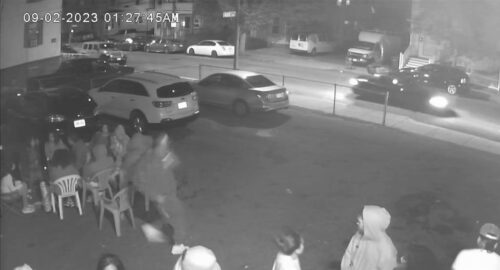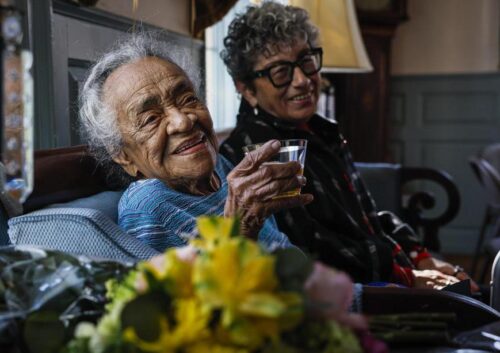Five years ago, Chelsea was reeling.
The pandemic had just begun, and the city was getting slammed by COVID-19. Its per capita infection rate was horrific, one of the highest in the country.
For months it seemed like Chelsea would never get out from under the virus, as the sickness sped from one home to the next. The city’s lousy air quality and attendant respiratory illnesses, dearth of greenspace, and hugely overcrowded housing created perfect conditions for contagion. Fear of immigration repercussions and language barriers made it harder for residents to seek help at first. The fact that 80 percent of Chelsea residents worked in blue-collar jobs deemed essential meant many residents kept going faithfully to work and were exposed every day.
In Chelsea, as in many places, the pandemic laid bare all of the ways in which this country is broken.
But COVID-19 did not break Chelsea. It made the city stronger.
“Bad things happened, but we came out so powerful,’’ said Elaine Mendes, pastor and director of Revival International Center, a storefront church on Broadway. “The tragedy built up this beautiful, resilient community.’’
Those first few weeks were terrifying for everyone. Chelsea has long been blessed with community leaders who are forces of nature, but even they were initially overwhelmed.
“One of the things that the pandemic taught us is that the cavalry is not coming,’’ said Fidel Maltez, who headed the Department of Public Works in Chelsea in 2020 and is now city manager. “No one was coming to bail us out, so it is on us to do that.’’
Starting on March 11, 2020, city and nonprofit leaders held daily conference calls to coordinate the city’s response, identifying the most urgent needs — food, diapers, health care — and creating an entire emergency ecosystem, including a hotel where infected residents who lived in crowded apartments could isolate. The usual Chelsea powerhouses — Gladys Vega of La Colaborativa and Roseann Bongiovanni of GreenRoots among them — helped the city coordinate relief efforts, but plenty of smaller outfits joined the battle, too. Chelsea Community Connections, which until then had been a community closet, providing families with free clothes, took the reins of a massive free diaper distribution operation. At Revival church, Mendes, who previously had been giving those who needed them about 40 boxes of food per week, was suddenly distributing at least 800. At Chelsea Black Community, originally formed to advocate for the city’s Black residents, leader Joan Cromwell, a nurse, said her group expanded its mission to help coordinate vaccinations for all residents. Community farms run by GreenRoots gave residents a place to safely gather and grow and collect fresh food.
A lot of folks were embarrassed and afraid to accept the help at first. Recent immigrants were used to keeping to themselves, and staying below the radar.
“I remember being at those food lines and seeing mothers and children and that sense of shame,’’ said Maltez, his voice breaking at the memory. “And I was saying, ‘It’s OK, there’s no shame in that. We also have been through challenging times.’’’
Gradually, some amazing things happened. The people who were initially reluctant to go outside and accept help grew more comfortable in their own city. The bonds between them grew stronger. The organizations that were serving them — aided by an influx of pandemic relief and philanthropic funds — greatly expanded their capacity. Because residents trusted them to provide pandemic relief services, they were also open to their other offerings.
At Revival church, Mendez is still giving out boxes full of food, but she also offers Capoeira and yoga classes, community information and bingo nights, and ESL classes, all of them well attended. GreenRoots added a teaching kitchen to its food operation, and runs several cooking classes each week that are usually filled to capacity.
“A lot of folks have decided that they want to be in community more,’’ said Jojo Emerson, who heads the food operation.
At Chelsea Community Connections, diaper distributions have given way to wellness classes where women gather to learn about their health and advocate for themselves — and get a $30 Market Basket gift card — while their children are fed and cared for. Gathering regularly means those women have formed communities, too, friendships that allow them to rely on each other. At Chelsea Black Community, vaccination drives have given way to job training programs for young people, designed to redress some of the disadvantages that made Chelsea such a ripe target for the virus.
“We want them to be self-reliant financially, so they don’t have to double- and triple-up in apartments,’’ said Cromwell.
Along the way, Chelsea Black Community became a full-fledged nonprofit and, like the other smaller organizations that stepped up during the pandemic, a power player in the city. Its strength, like the tighter connections forged by the pain of the pandemic, has made Chelsea stronger than ever.
“We are a community unbroken,’’ said Mendes.
That inspiring resolve is being tested again now, as federal immigration authorities target Chelsea in their push for mass deportations. It’s hard for people to stay connected when they are afraid to leave their homes.
“It might not be a pandemic that is killing people, but it’s a different kind of pandemic,’’ Cromwell said. “We realize we have to stick together.’’
City manager Maltez and others worry that fear will fray the deepened sense of community forged during COVID, diminishing the trust those who lead the city spent so long building.
“Until now, I would say, 1,000 percent, people are willing to come out more,’’ he said. “But this week has been rough. People are afraid.’’
It’s possible even the mighty people of Chelsea, who faced down the terrible virus, are no match for this new contagion.
Globe columnist Yvonne Abraham can be reached at yvonne.abraham@globe.com.


